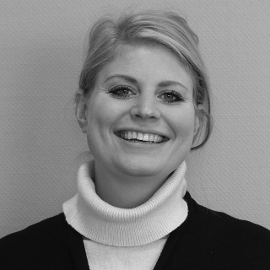
Researcher Unthinkable Marketing
Susan Klijsen-van Elteren is a researcher in the lectorate Unthinkable Marketing.
Susan has been working at Avans University of Applied Sciences since 2009. Susan is focused on innovation. For this she likes to be aware of the latest developments in order to translate these into innovative opportunities within and outside an organization. This can be translated into brand and marketing concepts as well as interior concepts. Susan in a few words: positive, innovative, future-oriented, entrepreneurial.
Expertise
Susan’s expertise is in branding and innovation management.Susan likes to think in concepts.For this she followed several concept related studies:Commercial Economics and a Master Imagineering (Business Innovation from the experience perspective), both in Breda.She also followed Retailstyling at Academie Artemis in Amsterdam and interior design at the Interieuracademie in Utrecht. She also worked with several consultancies to see concept development in practice: full-service advertising agency Ogilvy in Amsterdam and strategic retail consultancy Crossmarks in den Bosch.
Research
Economic growth is part of “business as usual,” business that we have come to think is normal. If our economy were to stop growing, we expect it to lead to an economic collapse resulting in widespread unemployment and misery.
Commercial businesses, governments, schools and hospitals will go bankrupt and no longer be able to provide our basic services.We collectively fear the consequences of de-growth.
At the same time, we know that economic growth now threatens life on our planet.Despite our efforts to make growth greener, including through a variety of technological innovations, recycling and energy cuts, we are failing to achieve a just world within Earth’s limits (Raworth, 2017).
We live in a culture of consumerism that leads us to believe that our happiness depends on buying products and services. The economic engines of this culture are companies whose business models are based on selling as much stuff as possible for the sake of their own growth and profit maximization. Economic growth and profit maximization are two central features of capitalism: an economic approach in which the owners of capital invest to grow their capital.
hus, one could argue that capitalism threatens life on our planet. So it seems prudent to think about alternative ways of doing business; ways that do not depend on or have to lead to economic growth.But can we? Are we at all capable of thinking of alternatives to the current, capitalism-based way of doing business?
This is the question being explored in this project, where we consider the practice of “planned obsolescence”: the artificial shortening of a product’s lifespan, regardless of the resources and energy expended in its production (Bulow, 1986).So companies deliberately make stuff and services that break down or become obsolete quickly, forcing consumers to keep buying new stuff and services.
The economic engines of this culture are companies whose businessm
It could be argued, then, that capitalism threatens life on our planet. So it seems wise to think about alternative ways of doing business; ways that do not depend on or have to lead to economic growth. But can we? Are we at all capable of thinking of alternatives to the current, capitalism-based way of doing business?
This is the question being explored in this project, where we consider the practice of “planned obsolescence”: the artificial shortening of a product’s lifespan, regardless of the resources and energy expended in its production (Bulow, 1986). So companies deliberately make stuff and services that break down or become obsolete quickly, forcing consumers to keep buying new stuff and services. Good for their profits, but disastrous for the earth, because we waste scarce resources and energy and create a lot of unnecessary waste.Waste that we then dump in places where it doesn’t bother us.Some examples of planned redundancy include low-quality fast fashion clothing, (batteries and software from) cell phones, and irreparable consumer electronics
Career
Susan has been associated with Avans University of Applied Sciences Breda since 2009. Working at Academy of Business & Entrepreneurship (ABE).For Avans she has developed various activities; from teacher, coordinator to knowledge circle member connected to the lectorate Unthinkable Marketing.
She contributes to curriculum development and innovation.
Susan on a sustainable future:
